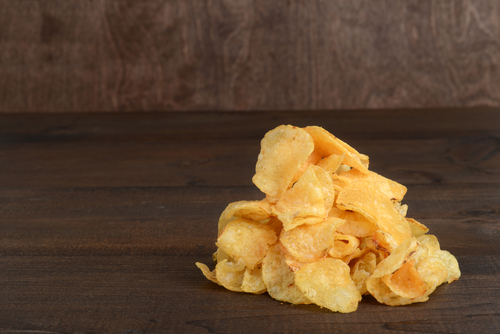Short answer
Kettle Brand Chips pride themselves on all natural, non-GMO products that are certified Kosher. These chips may have healthier ingredients compared to other chips on the market but depending on which variety you choose, the fat, carbohydrate and sodium content may be quite high. The other concern is how much acrylamide (a carcinogenic compound) is present and what are the potential long-term adverse health effects.
Recommended Alternative
Long answer
Kettle Brand Chips are very popular snacks that are available in over 30 varieties. A few varieties are labeled organic but most just state “all natural ingredients and flavorings.” Most Kettle Brand Chips are high in carbohydrates that can result in elevated glucose levels and a spike in insulin release. This along with the high fat content and high caloric content can lead to weight gain, Type 2 diabetes and metabolic syndrome. When intra-abdominal fat forms, this “toxic soup” can predispose to a combination of high blood lipids, high blood pressure, Type 2 diabetes and a higher risk of cardiovascular disease - also known as metabolic syndrome. The other problem with rising and crashing glucose levels is this can leave you feeling hungry which can lead to overeating and continued weight gain. Although the fats found in Kettle Brand Chips are mostly the healthy variety, these polyunsaturated and monounsaturated fats still carry calories that lead to weight gain. One advantage is that Kettle Brand Chips contain no trans fats.
According to a 2017 study published in The American Journal of Clinical Nutrition, individuals that ate fried potatoes (chips, french fries or hash browns) two or more times a week appeared to double their risk of death from all causes. Eating potatoes that were not fried was not found to increase mortality risk. The initial study was focused on evaluating 4,400 people over the course of eight years to monitor the effects of osteoarthritis. The researchers then decided to evaluate the effect of potato consumption in this same group. In this purely observational study, the data demonstrated double the risk of death over the course of the study if fried potatoes were consumed two or more times a week. Because this was an observational study and not a controlled trial it is not clear if fried potatoes were the main culprit associated with higher mortality. According to the National Potato Council, Americans in 2014 ate an average of 112 pounds of potatoes yearly with 33 pounds being fresh and 78 pounds being processed. According to the Centers for Disease Control 9.3% of Americans carried the diagnosis for Type 2 diabetes that same year and these percentages continue to climb. According to a publication in the British Medical Journal eating four or more servings of boiled or mashed potatoes increased high blood pressure risk by 11% but fried potatoes in the same amounts increased the risk by 17%.
Kettle Brand Chips (depending on the variety) may contain high levels of sodium which can predispose to high blood pressure, swelling (edema) and risk of cardiovascular disease. The other concern when frying these chips is that a byproduct of processing is acrylamide - a carcinogenic compound that is created when the starchy potatoes are fried at high temperatures. To their benefit, Kettle Brand Chips lowered their acrylamide levels by 87% between 2005 to 2011. It is still unclear how much acrylamide is a safe amount over a long period of time. In 2013 the U.S. Food and Drug Administration recommended that people cut back on food that is high in acrylamide which can include coffee, bread products, cereals and cookies.
Some Kettle Brand Chips are vegan and gluten-free but checking the label is important because some of the varieties do not meet these standards. The main issue is that the manufacturing process may involve facilities that also produce dairy and or gluten-containing products.
In general Kettle Brand Chips are high in fat, carbohydrates and calories. The multiple varieties of flavors have become extremely popular to individuals that love processed snacks. The recommendation is to enjoy in extreme moderation and for healthier alternatives choose homemade organic baked chips that are low in fat and sodium and come from vegetables that are low in carbohydrates - zucchini, cucumber, kale and tomato.
Possible short-term side effects
- elevated glucose
- elevated blood pressure
- headache
- swelling (edema)
Possible long-term side effects
- weight gain
- metabolic syndrome
Ingredients to be aware of
- sea salt
- acrylamide from frying the potatoes
- possible gluten and or dairy cross-contamination

Benefits
- non-gmo
- certified kosher
- some organic varieties
- no trans fats
Healthier alternatives
- organic low carb, low fat, low calorie vegetable chips
Our Wellness Pick (what is this?)
Bare Natural Apple Chips
- Gluten-free snack
- Baked, not fried
- Contains 6 bags
- No added sugar
- Crunchy & flavorful
 Approved by
Approved by 















